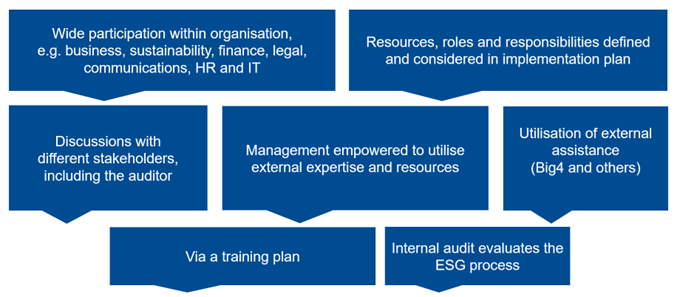11. Increased need for additional resources and expertise
The main implications of the government proposal state that sustainability reporting will be a significant resource challenge for companies. The diversity and complexity of the data collected and processed require new skills. Many companies will use external expertise to ensure they have the necessary skills. It should be noted that the statutory auditor cannot – in order to remain independent – participate in the preparation of the sustainability report.1
The FIN-FSA asked audit committees to describe how they ensure that their company has adequate resources and expertise at its disposal for the implementation of sustainability reporting (question 6).
Figure 11. Examples of responses to question 6

Audit committees have recognised the need for additional internal resources and increased expertise. Respondents stated, among other things:
- “The company has assessed the significant additional need for resources in the coming years due to increasing reporting requirements.”
- “The company has assessed the additional resources required by sustainability reporting, as a result of which it has begun to strengthen the resources of the Group’s financial function and to better coordinate the Group’s internal resources.”
- “Meeting the reporting requirements will require the participation of a wide range of experts in the preparation of the report from the company’s various functions and levels, as high-quality reporting will also require detailed knowledge of the business.”
Around half of the respondents ensure that they have sufficient resources by using external experts. The respondents often seek external expertise “as required”. Many stated that they use an external expert, for example at different stages of the project to ensure sufficient expertise. Examples of the different stages mentioned include ESRS gap analysis, materiality assessment or climate impact analysis. External assistance was also used to increase the expertise and expand the competence of the company’s own personnel.
According to a number of respondents, the adequacy of resources is also ensured by the extensive involvement of the organisation. For example, one respondent stated that “the project team consists of nominated business experts from different disciplines and representatives from support functions (e.g. IT, finance, HR, procurement)”. Some responses emphasised the involvement of business operations. For example, one respondent stated that “the majority of participants are business representatives whose daily work includes sustainability matters”.
Audit committees also assess the level of adequate resources and necessary expertise by monitoring the sustainability reporting implementation projects and receiving situation reports from management. Responses included the following comments.
- “The audit committee receives regular updates on the progress of the CSRD project and it is the responsibility of the project to highlight any resource shortcomings.”
- “The company’s management team will discuss sustainability reporting and its implementation on a monthly basis in the second half of 2023 and report back on this to each audit committee meeting. An essential element of implementation also includes the ongoing review of expert resources, both quantitatively and qualitatively.”
Companies are also aiming to increase expertise through training. According to the responses
- “Training needs are assessed as part of plans.”
- “Training on the new sustainability reporting regulations by an external expert is arranged in September 2023 for the company’s board of directors, board committees and management.”
- “The company’s ESG experts actively participate in industry working groups developing sustainability, receive training and discuss reporting expectations with stakeholders.”
A few respondents highlighted the assisting role of internal audit in the development of sustainability reporting. For example, one respondent stated that “the company is currently conducting an internal audit on the management of sustainability, in accordance with the 2023 audit plan for internal audit approved by the audit committee. The audit will cover, for example, resources and expertise, and the results of the report will be delivered to the audit committee during 2023”.
According to the understanding obtained by the FIN-FSA, the need for additional resources and new expertise has been clearly recognised in audit committees. Sustainability reporting is a significant challenge with regard to expertise, and organising sustainability reporting requires extensive cooperation within the organisation. The FIN-FSA considers scarcity of resources and expertise to be one of the biggest challenges in implementing sustainability reporting. The FIN-FSA also considers it important that the expertise of external experts is sufficiently transferred to companies and that companies participate to the extent necessary in the work carried out by external experts.
1 Government proposal 20/2023 vp, pp. 17–18 (Proposals and their implications) (in Finnish).